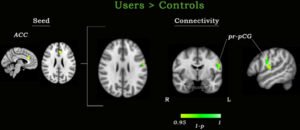Convincing evidence that regular cannabis use can increase feelings of empathy has been presented among the findings of a new study.
Previous studies have highlighted the potential benefits of cannabis in treating certain medical conditions. However, this latest finding is the first to find a link between cannabis and the ability to interpret and experience emotions in others.
In their published research, the researchers behind the study detail their methods, which included both psychological evaluations and direct imaging of volunteers to deduce the potential link between cannabis use and feelings of empathy towards others.
First, the team solicited volunteers representing various age groups and genders, as well as regular cannabis users and non-users. The volunteers were also screened for potential personality disorders or other psychological conditions that might affect the study. Others were removed due to substance abuse or other factors that may also influence the research.
After selecting 85 regular cannabis users and 51 non-users (as a control group), the team subjected them to two different examinations. The first was a psychological questionnaire—the second involved fMRI imaging of the volunteers’ brains. The results of both were considered significant.
Results: Cannabis Use Increases Feelings of Empathy
The psychological portion of the study looked at four indicators of empathy. The researchers define these four “subscales” as “Perspective Taking (PT), the capacity to place oneself in the shoes of another; Emotional Comprehension (CE), the ability to recognize and understand other people’s emotions and impressions; Empathic Stress (ES), the ability to be in tune with others’ negative emotions; and Empathetic Happiness scale (AE), the ability to feel others’ positive emotions.”
An analysis of the results showed a marked increase across all areas, indicating a high probability that cannabis use increases feelings of empathy. The most significant was the difference in Emotional Comprehension, a hallmark of empathy, showing that the cannabis users felt an elevated capacity to recognize other people’s emotions.
Next, 46 of the cannabis users and 34 of the control group submitted to resting-state fMRI brain scans. According to the study, “regular cannabis users showed greater connectivity between the anterior cingulate cortex (ACC) and the pre-posterior central gyrus (pr-pCG).”


This result was considered significant by the researchers, as “the ACC is a region that is prone to the effects of cannabis consumption and is also greatly involved in empathy.” In their announcement of the study’s results, they also note that the increased activity in the ACC “had stronger connectivity with brain regions related to sensing the emotional states of others within one’s own body.”
In short, the parts of the brain associated with feelings of empathy were more active in the users and were more connected with the parts of the brain related to sensing those emotions internally. In effect, the fMRI backed up the idea that cannabis use dramatically increases feelings of empathy in users compared to non-users.
“While our results differed from those studies reporting deficits in emotional detection on chronic cannabis users,” the researchers explain, “our study indicates a greater emotional comprehension and a greater ACC functional connectivity associated with empathy-related areas in users when compared to controls.”
Results May Offer Path to Treatments for People with Marked Deficits in Social Interactions
The research team concedes that this is only one study and that the relatively small sample size is insufficient to draw definitive conclusions across a wider population. They also concede that an increased capacity for empathy may be a trait users had before use, as opposed to the drug causing such feelings. The research also took place in Mexico, and the team notes that the typical levels of THC, the active ingredient in cannabis, are typically much higher in the United States than in Mexico, a factor that could also affect the results.
Still, the team says that the results were solid and compelling. They also point out that if supported by further studies, this research could open up a new avenue for certain patients.
“Although further research is needed, these results open an exciting new window for exploring the potential effects of cannabis in aiding treatments for conditions involving deficits in social interactions, such as sociopathy, social anxiety, and avoidant personality disorder, among others,” said study co-author Víctor Olalde-Mathieu, PhD, of the Universidad Nacional Autónoma de México.
Christopher Plain is a Science Fiction and Fantasy novelist and Head Science Writer at The Debrief. Follow and connect with him on X, learn about his books at plainfiction.com, or email him directly at christopher@thedebrief.org.

